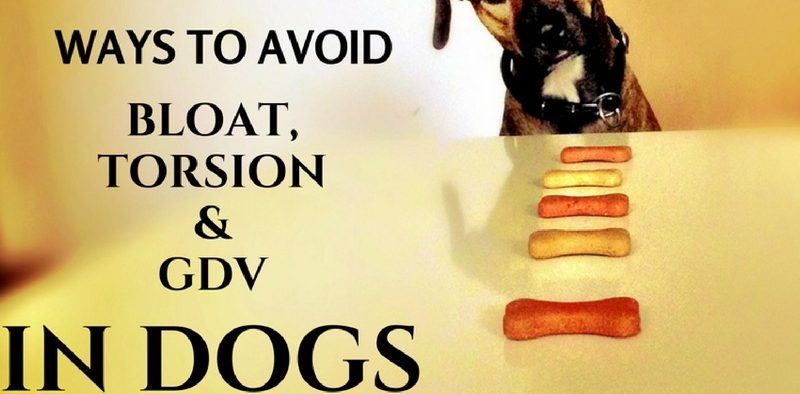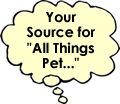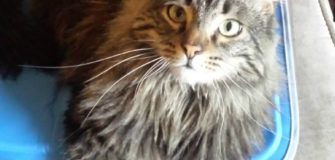10 Ways to Avoid Bloat in Dogs
Share

Binge eating is just as dangerous for our pets as it is for us. Gulping down food can result in a number of eating disorders and health problems for your pet including simple (but annoying problems) that include passing gas or burping. It also causes more serious problems such as bloat , torsion or Gastric Dilation-Volvulus (GDV).
Below is a very brief overview of the differences between bloat, torsion and GDV – followed by a very detailed overview of how you can stop your dog from wolfing his food and thereby reducing the risk of bloat. (If you have a cat, check out this informative article showing various Methods of Feeding Your Cats)
What “Bloat” Means for Dogs
Bloat is a very serious, often fatal disorder that occurs when your dog’s stomach fills with air, fluid or food. The food puts pressure on other organs, which causes difficulty breathing and reduces the blood supply to vital organs.
What “Torsion” Means for Dogs
The term “Torsion” means “twisted”. In a stomach torsion, the degree of “twist” is less than that which completely obstructs the outflow of gas, liquid, or ingesta from the stomach. This is an extremely painful, often fatal condition for your pets.
What “Gastric Dilation Volvulus” Means for Dogs
GDV is the most serious, and nearly always fatal, condition in which the dog’s stomach distorts or twists while bloated (filled with air or food). According to the ASPCA, between 25-50 percent of dogs die from GDV – even with immediate treatment. This is, in fact, how we lost Roscoe, our beloved Beagle-Labrador mix.
GDV can affect any breed of dog, but it strokes most often in large dogs who have deep chests (such as Saint Bernards, Akitas, Irish Setters, Boxers, Basset Hounds, Great Danes, Weimaraners and German Shepherds). We wish we had known this when we had Roscoe. These conditions can also be hereditary in nature. (Take a look at our article on Doggy DNA for more information).
10 Ways to Avoid Bloat, Torsion and GDV
1. Make food less accessible.
If you have a dog that is prone to GDV or bloat, you’ll want to avoid “free-feeding”. Instead, feed your dog several small meals, rather than one or two larger ones, throughout the day.
You may want to consider feeding them by using games (hiding kibble around the house) so they have to “hunt” for their food and are forced to eat small amounts through the day. If you have a scent dog, you may want to do this in several rooms so that you can control access.
2. Use automatic feeders
This is a good time to consider an automated feeder like the PetSafe 5-Meal Automatic Pet Feeder. You can schedule it to feed your pet up to five times per day.
Include canned food in your dog’s diet (check with your vet before starting a new diet and be sure to transition your pets slowly to avoid stomach upset).
3. Add water to food
If you feed a dry dog food, you may want to add water prior to feeding. Dry dog food tends to expand in your pet’s stomach and this can cause pets to overeat because they don’t realize they are full until after the food has expanded.
You may also want to consider changing to a raw diet or a modified raw diet (such as our favorite, The Honest Kitchen)
5. Separate pets during feedings
Separate your pets during feeding time. Many pets feel threatened by another pet’s presence and this makes them rush to eat, in hopes of getting more food (the other pet’s leftovers) or due to worry about another pet eating their food.
6. Maintain your dog’s weight
Your dogs weight is a very important consideration and you should be making sure they are always at an optimal weight to avoid health problems. We have some suggestions on low-calorie, All-Natural Treats You Can Feel Good About as well as information on some Trick Ways to Lower Pets Weight.
If your pet is in training and eats lots of treats, consider using pet food as their reward. If they still need something different to do what they’re asked, here is a list of Training Treats that Don’t Pack On the Pounds.
Always check with your veterinarian prior to beginning any weight loss programs for pets. Be sure you limit rigorous exercise before and after meals – running around after a heavy meal is no better for your pets than it is for you.
7. Avoid feeding your dog from a raised bowl
We love our Neater Feeder and it’s wonderful for our senior dog, Cheiss, who suffers from arthritis. He doesn’t have to bend over to get his food and it takes some of the pressure off of his hips. However, if you have a pet who “wolfs” his food down, the raised bowl is not for you.
Unless advised to do so by your vet, you’ll want to stay with a ground feeder as this is a more natural eating position for your pets.
8. Use a bowl designed to help slow eating.
We’ve looked at some of the most effective bowls on the market for slowing down fast eaters. We’ve also included very inexpensive ways to slow your dog’s food consumption at the end of the article.
Slo-bowl: The Kyjen Slo Bowl is a wonderful way to keep your pets from wolfing down their food. This feeder won Product of the Year at Global Pet Expo. Kyjen Drop Slo-Bowl It’s also available in many different sizes and designs and colors so you will always match your kitchen.
Northmate Interactive Feeder
This new layout looks pretty strange when it’s sitting next to your pet’s water dish, but the fact is, it’s an ingeniously designed bowl that helps slow your pets eating. It can be used for dogs or cats (although we’ve personally had better luck with dogs), and it forces your pet to eat “around” the grass. If you feed a diet like The Honest Kitchen (like we do), you may want to consider alternative bowls first. It takes them longer to “lap” up the food and isn’t messy. You can just slip the bowl into the dishwasher when they finish eating!
Gobble Stopper: Loving Pets Gobble Stopper Slow Pet Feeding Supplies for Dogs, Small This is a fun little tool that can fit in any sized pet’s bowl.
Brake Fast Bowl:This is another cleverly designed feeder that forces your dog to eat around his food, which slows them down. The fact that the bowl slides actually helps them work a little harder during feeding time. Here is a review we did on the Brake Fast Bowl years ago…
9. Use Puzzle Toys
The Aikiou Activity Food Center for Dogs is a great way to slow dogs down. Instead of just “gulping” their food, they must interact with the toy to “hunt” their food.
Nina Ottosson Toys: Other puzzle toys we enjoy for dogs include Nina Ottosson DogTwister Interactive game. These toys help entertain a dog and make them work a little harder for their food.
BONUS: Three Inexpensive Fixes to Slow a Pet's EatingYou don’t’ have to spend hundreds of dollars to make your pet eat a little slower. These are some alternative ways you can slow your pets eating without going broke in the process.
- Cupcake pans: Slow your pets eating by using a cupcake pan and placing food in each of the cups. Your dog and cat must slow down in order to get to each cup.
- Tennis Balls: Depending on the size of your dog (and the interest they have in tennis balls), you can place several balls in the bowl to make your dogs eat “around” the balls.
- Rocks: Placing a large rock in your pet’s bowl may also help slow down eating, but be careful your pet doesn’t decide to start chewing on the rock (this can actually be a problem).


















